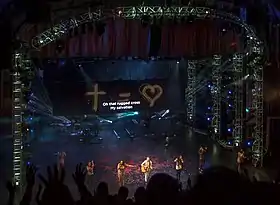Worship service (evangelicalism)
In evangelical Christianity, a worship service is a time when believers meet to praise, worship, pray to God and receive a teaching (sermon) based on the Bible. It can take place with the church or with the family. Meetings can be held on weekdays, but Sundays have a special connotation.
Form
.jpg.webp)


Worship service in Evangelical churches is seen as an act of God's worship.[1] There is no liturgy, the conception of worship service is more informal.[2] It is usually run by a Christian pastor. It usually contains two main parts, the praise (Christian music) and the sermon, with periodically the Lord's Supper.[3] [4][5][6] During worship there is usually a nursery for babies.[7] Children and young people receive an adapted education, Sunday school, in a separate room.[8]
With the 1960s' charismatic movement, a new conception of praise in worship, such as clapping and raising hands as a sign of worship, took place in many evangelical denominations.[9]
In the 1980s and 1990s, contemporary Christian music, including a wide variety of musical styles, such as Christian Rock and Christian Hip Hop, appeared in the praise.[10][11][12]
In the 2000s and 2010s, digital technologies were integrated into worship services, such as the video projectors for broadcasting praise lyrics or video, on big screens.[13][14] The use of social media such as YouTube and Facebook to retransmit live or delayed worship services, by Internet, has also spread.[15] The offering via Internet has become a common practice in several churches.[16][17]
In some churches, a special moment is reserved for faith healing with laying on of hands during worship services.[18] Faith healing or divine healing is considered a legacy of Jesus acquired by his death and resurrection.[19]
The offerings and the tithe occupies a lot of time in the worship services.[20] Often associated with the tithe mandatory, this doctrine is sometimes compared to a religious business.[21][22][23][24]
Places of worship

Places of worship are usually called "churches".[28][29][30] In some megachurches, the building is called "campus".[31][32] The architecture of places of worship is mainly characterized by its sobriety.[33][34] The latin cross is one of the only spiritual symbols that can usually be seen on the building of an evangelical church and that identifies the place's belonging.[35][36]
Some services take place in theaters, schools or multipurpose rooms, rented for Sunday only.[37][38][39] Because of their understanding of the second of the Ten Commandments, evangelicals do not have religious material representations such as statues, icons, or paintings in their places of worship.[40][41] There is usually a baptistery on the stage of the auditorium (also called sanctuary) or in a separate room, for the baptisms by immersion.[42][43]
House church
In some countries of the world which apply sharia or communism, government authorizations for worship are complex for Evangelical Christians.[44][45][46] Because of persecution of Christians, Evangelical house churches have thus developed.[47] For example, there is the Evangelical house churches in China movement.[48] The meetings thus take place in private houses, in secret and in "illegality".[49]
Megachurches


Worship services take on impressive proportions in the megachurches (churches where more than 2,000 people gather every Sunday. In some of these megachurches, more than 10,000 people gather every Sunday. The term gigachurch is sometimes used.[50][51] For example, Lakewood Church (United States) or Yoido Full Gospel Church (South Korea).[52]
Groups
IFES are groups of Evangelical students coming together on campuses in 150 countries around the world to share their ideas on the Bible.[53]
Full Gospel Business Men's Fellowship International meetings are held in restaurants or hotels and Christian businessmen talk about their faith.[54]
See also
References
- Gerald R. McDermott, The Oxford Handbook of Evangelical Theology, Oxford University Press, UK, 2013, p. 311
- Roger E. Olson, The Westminster Handbook to Evangelical Theology, Westminster John Knox Press, UK, 2004, p. 284
- Bruce E. Shields, David Alan Butzu, Generations of Praise: The History of Worship, College Press, USA, 2006, p. 307-308
- Robert Dusek, Facing the Music, Xulon Press, USA, 2008, p. 65
- Gaspard Dhellemmes, Spectaculaire poussée des évangéliques en Île-de-France, lejdd.fr, France, June 7, 2015
- Michael Lee, The Diffusion and Influence of Contemporary Worship, christianitytoday.com, USA, March 18, 2017
- Greg Dickinson, Suburban Dreams: Imagining and Building the Good Life, University of Alabama Press, USA, 2015, p. 144
- Jeanne Halgren Kilde, When Church Became Theatre: The Transformation of Evangelical Architecture and Worship in Nineteenth-century America, Oxford University Press, USA, 2005, p. 159, 170, 188
- Robert H. Krapohl, Charles H. Lippy, The Evangelicals: A Historical, Thematic, and Biographical Guide, Greenwood Publishing Group, USA, 1999, p. 171
- Suzel Ana Reily, Jonathan M. Dueck, The Oxford Handbook of Music and World Christianities, Oxford University Press, USA, 2016, p. 443
- Mathew Guest, Evangelical Identity and Contemporary Culture: A Congregational Study in Innovation, Wipf and Stock Publishers, USA, 2007, p. 42
- Don Cusic, Encyclopedia of Contemporary Christian Music: Pop, Rock, and Worship: Pop, Rock, and Worship, ABC-CLIO, USA, 2009, p. 85-86
- Christina L. Baade, James Andrew Deaville, Music and the Broadcast Experience: Performance, Production, and Audience, Oxford University Press, USA, 2016, p. 300
- AARON RANDLE, Bucking a trend, these churches figured out how to bring millennials back to worship, kansascity.com, USA, December 10, 2017
- Mark Ward Sr., The Electronic Church in the Digital Age: Cultural Impacts of Evangelical Mass, ABC-CLIO, USA, 2015, p. 78
- Michael Gryboski, Millennial-Majority Churches Detail Challenges, Success Stories in Growth and Finances, christianpost.com, USA, June 18, 2018
- Ghana News Agency, Asoriba launches church management software, businessghana.com, Ghana, February 3, 2017
- Cecil M. Robeck, Jr, Amos Yong, The Cambridge Companion to Pentecostalism, Cambridge University Press, UK, 2014, p. 138
- Randall Herbert Balmer, Encyclopedia of Evangelicalism: Revised and expanded edition, Baylor University Press, USA, 2004, p. 212
- Marie-Claude Malboeuf and Jean-Christophe Laurence, Églises indépendantes: le culte de l'argent, lapresse.ca, Canada, November 17, 2010
- Laurie Goodstein, Believers Invest in the Gospel of Getting Rich, nytimes.com, USA, August 15, 2009
- Jean-Christophe Laurence, Le business religieux, lapresse.ca, Canada, November 17, 2010
- Trésor Kibangula, RDC : pasteur, un job en or, jeuneafrique.com, France, February 06, 2014
- Raoul Mbog, Le juteux business du pasteur évangélique Dieunedort Kamdem, lemonde.fr, France, December 25, 2015
- William H. Brackney, Historical Dictionary of the Baptists, Scarecrow Press, USA, 2009, p. 402
- Daniel E. Albrecht, Rites in the Spirit: A Ritual Approach to Pentecostal/Charismatic Spirituality, A&C Black, UK, 1999, p. 124
- Walter A. Elwell, Evangelical Dictionary of Theology, Baker Academic, USA, 2001, p. 236-239
- D. A. Carson, Worship: Adoration and Action: Adoration and Action, Wipf and Stock Publishers, USA, 2002, p. 161
- Jeanne Halgren Kilde, Sacred Power, Sacred Space: An Introduction to Christian Architecture and Worship, Oxford University Press, USA, 2008, p. 193
- Harold W. Turner, From Temple to Meeting House: The Phenomenology and Theology of Places of Worship, Walter de Gruyter, Germany, 1979, p.258
- Justin G. Wilford, Sacred Subdivisions: The Postsuburban Transformation of American Evangelicalism, NYU Press, USA, 2012, p. 78
- Anne C. Loveland, Otis B. Wheeler, From Meetinghouse to Megachurch: A Material and Cultural History, University of Missouri Press, USA, 2003, p. 2
- Peter W. Williams, Houses of God: Region, Religion, and Architecture in the United States, University of Illinois Press, USA, 2000, p. 125
- Murray Dempster, Byron D. Klaus, Douglas Petersen, The Globalization of Pentecostalism: A Religion Made to Travel, Wipf and Stock Publishers, USA, 2011, p. 210
- Mark A. Lamport, Encyclopedia of Christianity in the Global South, Volume 2, Rowman & Littlefield, USA, 2018, p. 32
- Anne C. Loveland, Otis B. Wheeler, From Meetinghouse to Megachurch: A Material and Cultural History, University of Missouri Press, USA, 2003, p. 149
- Annabelle Caillou, Vivre grâce aux dons et au bénévolat, ledevoir.com, Canada, November 10, 2018
- Helmuth Berking, Silke Steets, Jochen Schwenk, Religious Pluralism and the City: Inquiries into Postsecular Urbanism, Bloomsbury Publishing, UK, 2018, p. 78
- George Thomas Kurian, Mark A. Lamport, Encyclopedia of Christianity in the United States, Volume 5, Rowman & Littlefield, USA, 2016, p. 1359
- Cameron J. Anderson, The Faithful Artist: A Vision for Evangelicalism and the Arts, InterVarsity Press, USA, 2016, p. 124
- Doug Jones, Sound of Worship, Taylor & Francis, USA, 2013, p. 90
- William H. Brackney, Historical Dictionary of the Baptists, Scarecrow Press, USA, 2009, p. 61
- Wade Clark Roof, Contemporary American Religion, Volume 1, Macmillan, UK, 2000, p. 49
- Erwin Fahlbusch, Geoffrey William Bromiley, The Encyclopedia of Christianity, Volume 4, Wm. B. Eerdmans Publishing, USA, 2005, p. 163
- Yves Mamou, Yves Mamou: «Les persécutions de chrétiens ont lieu en majorité dans des pays musulmans», lefigaro.fr, France, March 20, 2019
- Wesley Rahn, In Xi we trust - Is China cracking down on Christianity?, dw.com, Germany, January 19, 2018
- Allan Heaton Anderson, An Introduction to Pentecostalism: Global Charismatic Christianity, Cambridge University Press, UK, 2013, p. 104
- Brian Stiller, Evangelicals Around the World: A Global Handbook for the 21st Century, Thomas Nelson, USA, 2015, p. 328
- Mark A. Lamport, Encyclopedia of Christianity in the Global South, Volume 2, Rowman & Littlefield, USA, 2018, p. 364
- Sam Hey, Megachurches: Origins, Ministry, and Prospects, Wipf and Stock Publishers, USA, 2013, p. 265
- Ed Stetzer, Megachurch Research - Terminology, christianitytoday.com, USA, October 9, 2008
- Alicia Budich, From Megachurch to "Gigachurch", cbsnews.com, USA, April 6, 2012
- IFES, OUR PEOPLE, ifesworld.org, UK, accessed January 27, 2018
- Vinson Synan, Amos Yong, Global Renewal Christianity: Europe and North America Spirit-Empowered Movements: Past, Present and Future, Charisma Media, USA, 2017, p. 26
Content in this edit is translated from the existing French Wikipedia article at fr: Culte (évangélisme); see its history for attribution.